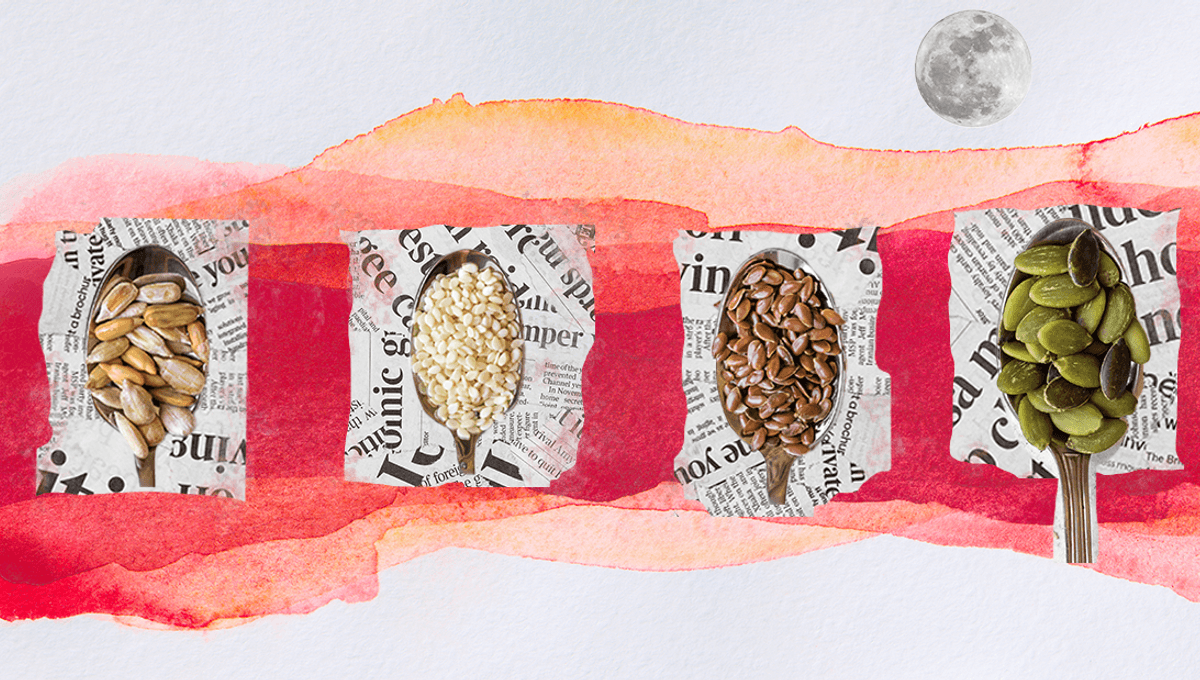
Anyone who’s experienced a menstrual cycle knows it can often feel like you’re at the whim of your hormones, but some people believe they have a solution: seed cycling. But what exactly is it – and, most importantly, does it actually do anything to help?
What is seed cycling?
Cast aside the image of a little pumpkin seed on a bicycle – this kind of cycling is of the menstrual variety. According to its proponents, seed cycling helps to balance out the hormones that regulate the menstrual cycle.
This naturopathic practice starts by assuming that someone’s menstrual cycle is 28 days, which has historically been considered the average, though a normal range is actually anywhere between 23 and 35 days. This is then split into two 14-day phases. If you don’t have a regular cycle, a common suggestion is that you go with the phases of the Moon (yes, really).
The first phase is presumed to coincide with the follicular phase of the menstrual cycle, which starts on the first day of your period. Over the next 14 or so days, there’s an increase in the production of estrogen. To boost this, the suggestion is to eat raw, ground-up pumpkin and flax seeds up until you ovulate.
Then begins phase 2, which is supposed to match up with the luteal phase, where production of the hormone progesterone increases, peaking and then dropping if there’s no pregnancy. Fans of seed cycling claim that switching to munching on ground-up sesame and sunflower seeds from the point of ovulation and throughout this phase will boost progesterone levels.
There are several supposed benefits to chowing down on all those seeds that are touted by proponents of seed cycling; people suggest it can help periods become more regular and less painful, ease premenstrual syndrome, help with conditions involving hormones like polycystic ovary syndrome (PCOS), manage menopause symptoms, and even help with infertility.
Does seed cycling work?
All of those supposed benefits might sound pretty amazing, but there’s a significant catch. Whilst there might be an abundance of anecdotes (of which many are on social media platforms like TikTok and Instagram) claiming that seed cycling is beneficial, there’s a lack of solid scientific evidence to back any of those claims up.
Many of the oft-quoted studies referenced by seed cycling proponents aren’t actually about seed cycling, though they do cover the seeds involved in it. One of these is a 1993 study that examined whether supplementing a traditional Western diet with flaxseed had any effect on the menstrual cycle.
Though the researchers found that, compared to controls, participants’ luteal phases were longer, and none experienced anovulation when taking flaxseed, there were no significant changes to the overall average cycle length, nor the concentration of estrogen during the follicular phase. The study concluded that the changes they saw were down to a group of compounds found in flaxseed called lignans – but there’s little weight in that conclusion, given there were only 18 participants.
Other studies have also looked at the components of the seeds that are supposed to be beneficial. It’s often claimed, for example, that the apparent effects of pumpkin seeds come from their zinc content. A recent review of 36 studies found that zinc supplementation could potentially improve some elements of PCOS and painful periods.
However, it found little evidence to support any role in treating endometriosis or menopausal symptoms. Similarly, a study examining two weeks of supplemental zinc sulfate’s effects on 32 postmenopausal patients found no significant evidence of it having any effect on estrogen or progesterone levels. However, there were only eight participants per experimental group.
It’s only in the last few years that studies specifically on seed cycling have started to pop up. Even then, they’re few and far between, with far from enough evidence to suggest that the practice has any “hormonal balancing” benefits – a recent review concluded as much.
A study published last year looked at the effectiveness of seed cycling in treating PCOS and concluded that it improved hormone levels. However, there’s a major problem with making such a conclusion: participants in the study (of which there were only 90) had to undergo a number of other changes, being instructed to take up 40 minutes of “brisk” walking, 60-minute “regular” walks, 10 minutes of deep breathing each morning, and a specific portion-controlled diet – so it’s not actually possible to determine if seed cycling was responsible for any changes seen.
The overall picture
If you’re experiencing problems with your menstrual cycle, or suspect that you might be having hormonal issues, it’s best to speak to a healthcare provider. The evidence (or rather lack of it) suggests that seed cycling isn’t going to help.
However, unless you’re allergic to the seeds involved, it’s unlikely to cause harm to your health either. In fact, seeds can be part of a balanced diet, adding unsaturated fats, protein, and fiber.
The biggest harm coming from seed cycling might end up being the hole it burns in your wallet – or the sheer boredom of eating seeds every. single. day.
All “explainer” articles are confirmed by fact checkers to be correct at time of publishing. Text, images, and links may be edited, removed, or added to at a later date to keep information current.
The content of this article is not intended to be a substitute for professional medical advice, diagnosis, or treatment. Always seek the advice of qualified health providers with questions you may have regarding medical conditions.
Source Link: People Are Talking About "Seed Cycling": Is It Actually Good For You?